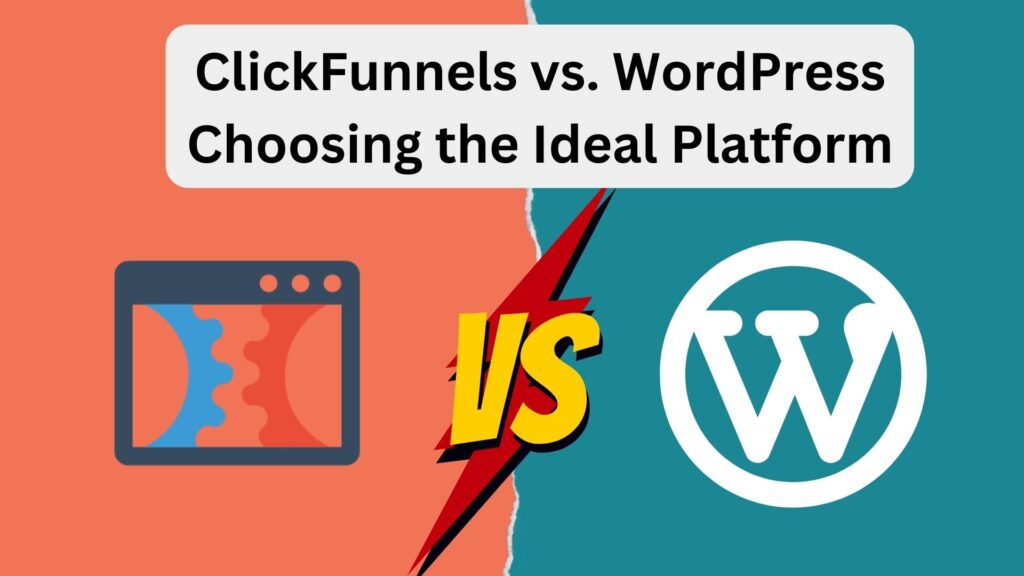In the dynamic realm of website creation and digital marketing, selecting the right platform is a critical decision that can significantly impact online success. Two prominent contenders, ClickFunnels and WordPress, stand at the forefront, offering distinct approaches to website building and marketing strategies. As businesses and entrepreneurs aim to establish a strong online presence, the choice between these platforms becomes a pivotal step toward achieving their objectives. This comprehensive comparison aims to dissect the functionalities, usability, costs, scalability, and support structures of ClickFunnels and WordPress, aiding individuals in making an informed choice tailored to their specific needs and aspirations.
Comparison of Functionality: ClickFunnels vs. WordPress
When contemplating the choice between ClickFunnels and WordPress, evaluating the functionalities and capabilities of each platform becomes crucial. Both platforms offer unique strengths and cater to different aspects of website development and marketing strategies.

ClickFunnels:
ClickFunnels specializes in creating sales funnels and optimized landing pages geared toward maximizing conversions. Its intuitive drag-and-drop interface makes it accessible for users without extensive technical expertise. With integrated tools for email marketing, upsells, downsells, and membership areas, ClickFunnels is designed to streamline the process of creating targeted marketing funnels.
WordPress:
In contrast, WordPress boasts a broader spectrum of functionalities beyond sales funnels. Its versatility enables the creation of various types of websites, from blogs to e-commerce sites and more. The extensive array of themes, plugins, and customization options empowers users to tailor their websites to specific needs. Additionally, WordPress’s blogging capabilities and SEO-friendly nature make it a preferred choice for content-driven websites aiming for a broader online presence.
Understanding the distinct functionalities of ClickFunnels and WordPress assists in deciphering which platform aligns better with specific business goals and objectives. Evaluating functionality sets the groundwork for making an informed decision based on the desired website’s purpose and requirements.
Ease of Use and User Interface: ClickFunnels vs. WordPress
The usability and interface of a platform play a pivotal role in user experience, particularly for individuals with varying levels of technical proficiency. Assessing the ease of use and user interface of ClickFunnels and WordPress helps in determining which platform aligns best with users’ comfort levels and expertise.

ClickFunnels:
ClickFunnels prides itself on its user-friendly, drag-and-drop interface. Its intuitive design enables users, even those without technical backgrounds, to create sales funnels effortlessly. The simplicity of ClickFunnels’ interface streamlines the process of constructing optimized landing pages and funnel sequences, catering to users looking for a straightforward, efficient platform.
WordPress:
Contrarily, WordPress presents a learning curve for beginners due to its vast array of customization options. While it may require a bit more time to familiarize oneself with the platform, WordPress offers immense flexibility for those seeking customization and design freedom. The introduction of the Gutenberg editor aims to enhance user experience, providing a more intuitive way to create content, yet it may still pose challenges for new users.
Assessing the ease of use and interface of ClickFunnels and WordPress is crucial in determining which platform aligns better with users’ preferences and comfort levels. While ClickFunnels emphasizes simplicity, WordPress offers more extensive customization options, catering to users with varying levels of technical expertise and specific design preferences.
Cost Comparison: ClickFunnels vs. WordPress
When considering building a website or sales funnel, understanding the costs associated with ClickFunnels and WordPress is pivotal. Both platforms come with distinct pricing structures and potential additional expenses that warrant careful consideration.

ClickFunnels:
ClickFunnels offers various pricing tiers, each with its features and limitations. The plans range from basic to advanced, with differences in the number of funnels, pages, and visitors allowed. While ClickFunnels provides a convenient, all-in-one solution, users might incur additional costs for third-party integrations, which could impact the overall expenses.
WordPress:
WordPress, being an open-source platform, is available for free. However, the associated costs come from hosting, premium themes, and plugins for advanced features. Depending on individual needs, expenses can vary, and the total cost might include domain registration, hosting fees, theme purchases, and plugin subscriptions.
Understanding the cost structures of ClickFunnels and WordPress aids in making an informed decision aligned with budgetary considerations. While ClickFunnels offers a more straightforward pricing model, WordPress provides flexibility but requires careful consideration of various expenses that might accumulate based on customization needs. Evaluating costs ensures that users select a platform that not only meets their requirements but also fits within their budget constraints.
Scalability and Flexibility: ClickFunnels vs. WordPress
Assessing the scalability and flexibility of ClickFunnels and WordPress is essential when envisioning the long-term growth and adaptability of a website or marketing strategy.
ClickFunnels:
ClickFunnels primarily focuses on creating optimized sales funnels and landing pages, excelling in its niche. However, its scope is limited when it comes to scalability beyond funnel-based marketing. Users seeking diverse website functionalities might find ClickFunnels restrictive in terms of broader website development.
WordPress:
WordPress stands out for its scalability and flexibility, catering to various website types beyond sales funnels. Its extensive range of themes, plugins, and customization options allows for the creation of diverse websites, including blogs, e-commerce stores, portfolios, and more. This versatility enables businesses to evolve and expand their online presence as their needs grow and change.
Evaluating the scalability and flexibility of ClickFunnels and WordPress aids in determining which platform aligns better with future growth plans and the evolution of business objectives. While ClickFunnels focuses on specialized funnel-based marketing, WordPress offers a more adaptable framework to accommodate diverse website needs and potential expansion strategies.

Support and Community: ClickFunnels vs. WordPress
Understanding the available support structures and community engagement for ClickFunnels and WordPress is pivotal in ensuring ongoing assistance and resources for users.
ClickFunnels:
ClickFunnels provides customer support channels, including email assistance and extensive documentation. Additionally, it offers resources like training materials and a user community for sharing insights and strategies. While the support options are available, they might be more limited compared to the vast WordPress community.
WordPress:
WordPress boasts an expansive and active community worldwide. Users benefit from forums, documentation, tutorials, and a vast array of third-party providers offering support and guidance. The thriving community ensures a wealth of resources, troubleshooting assistance, and ongoing updates and improvements.
Assessing the available support and community engagement of ClickFunnels and WordPress is essential in ensuring continuous assistance and access to resources for users. While ClickFunnels offers adequate support avenues, the extensive WordPress community provides a broader spectrum of resources and communal support for users seeking assistance and guidance.
Final Thoughts;
By evaluating functionalities, ease of use, costs, scalability, support, and community engagement, individuals can align their choice of platform with their specific goals, technical proficiency, and budget constraints. While ClickFunnels focuses on specialized funnel-based marketing, WordPress offers a broader spectrum of possibilities for diverse website creation and long-term growth.
Making the right choice between ClickFunnels and WordPress is pivotal for establishing a robust online presence and achieving success in website development and digital marketing endeavors. Ultimately, the decision should be driven by individual preferences, business objectives, and the desired trajectory of online growth and adaptability.


